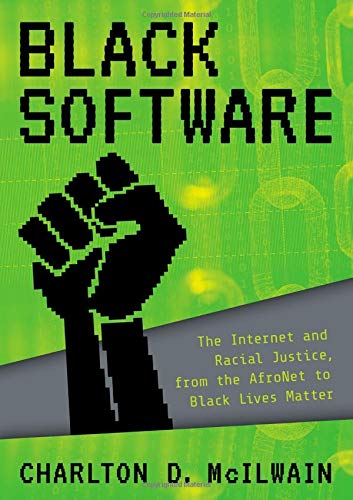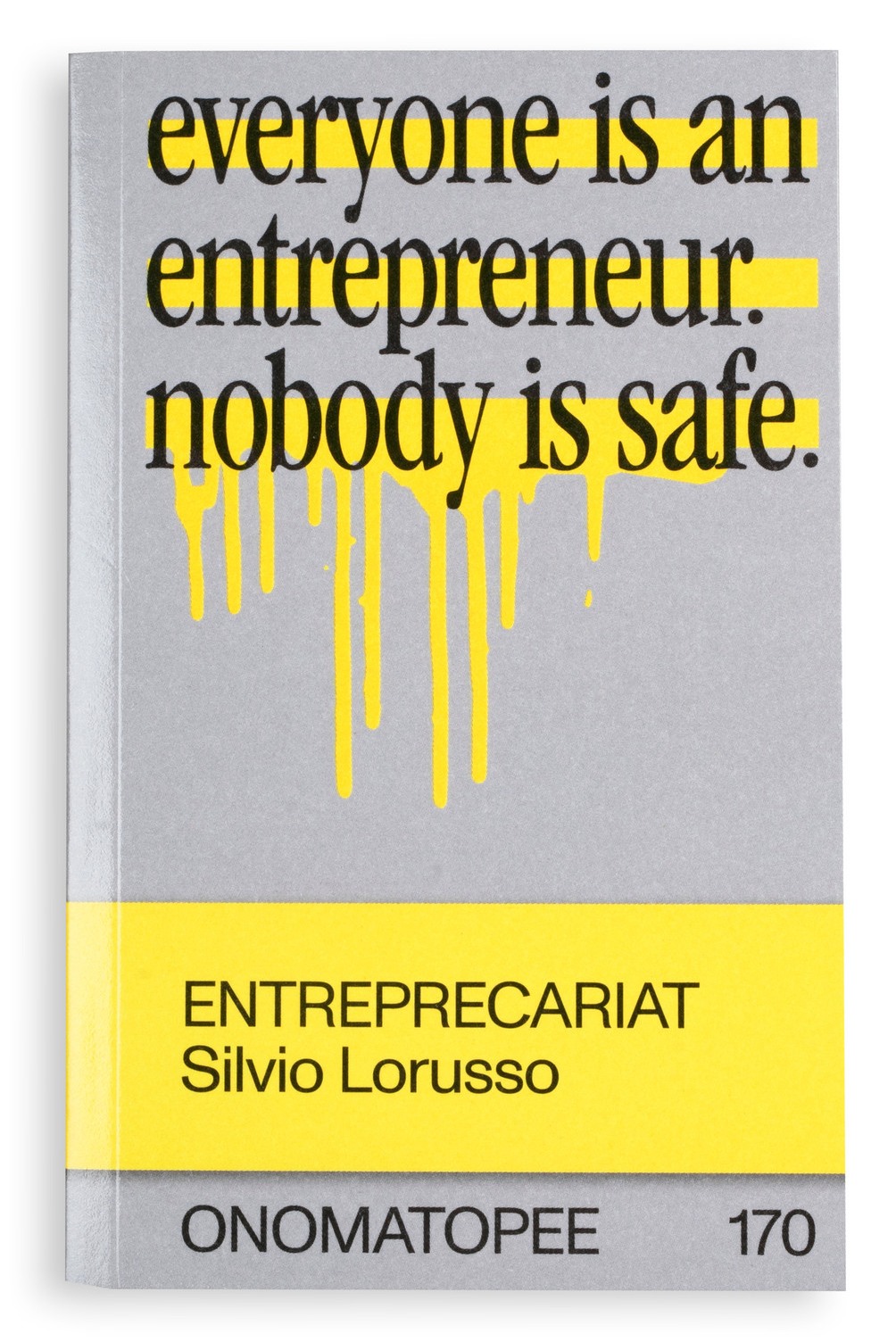Charlton D. McIlwain: Black Software: The Internet and Racial Justice, from the AfroNet to Black Lives Matter (2020)
Filed under book | Tags: · activism, afronet, black people, computing, history of computing, history of technology, internet, race, racism, technology

“Activists, pundits, politicians, and the press frequently proclaim today’s digitally mediated racial justice activism the new civil rights movement. As Charlton D. McIlwain shows in this book, the story of racial justice movement organizing online is much longer and varied than most people know. In fact, it spans nearly five decades and involves a varied group of engineers, entrepreneurs, hobbyists, journalists, and activists. But this is a history that is virtually unknown even in our current age of Google, Facebook, Twitter, and Black Lives Matter.
Beginning with the simultaneous rise of civil rights and computer revolutions in the 1960s, McIlwain, for the first time, chronicles the long relationship between African Americans, computing technology, and the Internet. In turn, he argues that the forgotten figures who worked to make black politics central to the Internet’s birth and evolution paved the way for today’s explosion of racial justice activism. From the 1960s to present, the book examines how computing technology has been used to neutralize the threat that black people pose to the existing racial order, but also how black people seized these new computing tools to build community, wealth, and wage a war for racial justice.
Through archival sources and the voices of many of those who lived and made this history, Black Software centralizes African Americans’ role in the Internet’s creation and evolution, illuminating both the limits and possibilities for using digital technology to push for racial justice in the United States and across the globe.”
Publisher Oxford University Press, 2020
ISBN 9780190863845, 0190863846
xi+296 pages
Video interview with author (Morning Joe, MSNBC, 2019).
Podcast interview with author (The Human and the Machine, 2019).
Reviews: Lori Emerson (LA Review of Books, 2021), Brian Alleyne (Computational Culture, 2021).
PDF (7 MB)
Comment (0)Silvio Lorusso: Entreprecariat: Everyone Is an Entrepreneur Nobody Is Safe (2018–) [IT, EN]
Filed under book | Tags: · capitalism, design, entrepreneurship, labour, platform, precariat, precarity, work

“Entrepreneur or precarious worker? These are the terms of a cognitive dissonance that turns everyone’s life into a shaky project in perennial start-up phase. Silvio Lorusso guides us through the entreprecariat, a world where change is natural and healthy, whatever it may bring. A world populated by motivational posters, productivity tools, mobile offices and self-help techniques. A world in which a mix of entrepreneurial ideology and widespread precarity is what regulates professional social media, online marketplaces for self-employment and crowdfunding platforms for personal needs. The result? A life in permanent beta, with sometimes tragic implications.”
Italian edition
With a foreword by Geert Lovink and an afterword by Raffaele Alberto Ventura
Publisher Krisis Publishing, Brescia, 2018
ISBN 9788894402902, 8894402908
223 pages
English edition
Translated by Isobel Butters
Publisher Onomatopee, Eindhoven, 2019
Creative Commons BY-NC 4.0 License
ISBN 9789493148161, 9493148165
257 pages
Interviews with author: Walter Marocchi (2019), Floor van Luijk (Metropolis M, 2020).
Reviews: Marco Petroni (Artribune, 2019), Tiziano Bonini (cheFare, 2019), Sandro Moiso (Carmilla, 2019), Giulio Gonella (Volume, 2020), Alessandro Ludovico (Neural, 2020).
Commentary: Nicola Bozzi (Digimag, 2017, EN).
Author
Publisher (IT)
Publisher (EN)
WorldCat (IT)
WorldCat (EN)
Entreprecariat – Siamo tutti imprenditori. Nessuno è al sicuro (Italian, 2018, 9 MB)
Entreprecariat: Everyone Is an Entrepreneur Nobody Is Safe (English, trans. Isobel Butters, 2019, 7 MB, added on 2020-5-12)
Recherches, 12: Trois milliards de pervers: Grande encyclopédie des homosexualités (1973) [FR, EN]
Filed under book, journal | Tags: · body, gender, lgbtq, psychoanalysis, sexuality, social criticism, theory

“‘Trois milliards de pervers: Grande encyclopédie des homosexualités’ [Three Billion Perverts: The Big Encyclopedia of Homosexualities] is the title of the twelfth issue of the journal Recherches, founded in 1965 by Félix Guattari. Published in March 1973, this issue caused a scandal, proclaiming the irruption of homosexuality in French society. Very quickly banned, seized, and destroyed for breach of moral standards, it became a milestone in the history of homosexual struggles. Recently reprinted, this publication is at once an historical document and an element of reflection for contemporary struggles for emancipation, shedding light on what could be a homosexual affirmation conceived as a radical break with the normative structures running through the social space.
Combining testimonies, original texts, and interviews; articulating social criticism, literature, philosophy, and psychoanalysis; across spaces as diverse as cafés, political meetings, prisons, asylums, parks, and urinals; and bringing together contributions from such figures as Gilles Deleuze, Fanny Deleuze, Michel Foucault, Jean Genet, Felix Guattari, Daniel Guérin, Guy Hocquenghem, Jean-Jacques Lebel, the actor Marie-France, Vera Memmi, Jean-Paul Sartre, and Jozy Thibaut, ‘Trois milliards de pervers’ takes the form of a collective of homosexuals reflecting on the come-on, masturbation, transvestites, scouting, and militant movements, in order to call into question all forms of desiring-production. As such, this publication set out to establish an entirely ‘new scientific spirit.'” (Source)
Publisher Recherches, Paris, Mar 1973
216+[8] pages
Reviews: Le Nouvel Observateur (1973), Les cahiers du GRIF (1974).
PDF (17 MB)
HTML, PDF (English trans. of Foucault’s Testimony at the Trial of Félix Guattari, in 1974, after the publication was seized; and “La Femme de Drague”, a conversation between seven women addressing the social and affective economy of seduction, trans. Gila Walker, Glass Bead, 2019)

